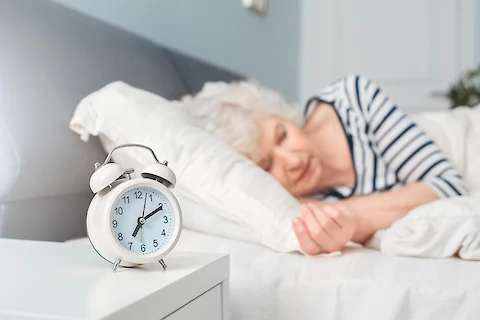
If you notice a senior loved one staying up all night, feeling groggy during the day, or mentioning sleep problems, you're not alone. Many seniors in and around Sheboygan experience changes in their sleep patterns and sleep quality as they age.
But sleep continues to be an essential part of self-care and significantly improves the quality of life for all seniors. You can support seniors' efforts to get more sleep by encouraging them to follow a few best practices.
How Do Sleep Quality and Patterns Change As We Age?
One of the most common shifts as seniors get older is a decrease in overall sleep duration. Seniors typically need between seven and nine hours of restful sleep per night, but many seniors report sleeping less than this recommended amount.
Additionally, they may experience more sleep disruptions and shorter periods of rapid eye movement (REM) and non-REM sleep compared to when they were in their 40s and 50s. This may be the result of hormonal changes, settling into new rhythms with an irregular routine due to retirement, and even medications or chronic health concerns. The result? Many seniors wake up earlier during the night or feel unrested even after a full eight hours of slumber.
Why is Good Sleep Quality Important for Seniors?
Improving seniors' sleep duration and sleep quality offer numerous benefits. Proper sleep has been shown to boost memory and immunity, reduce stress, maintain a balanced mood, and minimize pain levels. In contrast, multiple studies have found that lack of quality sleep may contribute to falls or other accidents, higher rates of depression and other mental health concerns, and even an increased risk of diseases like cardiovascular diseases.
How to Help Seniors Get Enough Sleep: Assess Their Current Sleep Quality
Before addressing specific sleep habits, it's important to understand how the senior is currently sleeping. Ask your loved one questions such as: How long are you sleeping? How do you feel when you wake up? Do you have any trouble falling asleep or staying asleep throughout the night? How many times per night do you wake up? Lastly, ask them about their energy throughout the day: are there moments of feeling extra tiredness or grogginess after a full night of sleep?
Encourage Seniors to Exercise
Encourage seniors to become more active by exercising during the morning or early afternoon. Regular physical activity is one of the most significant ways to improve sleep quality in seniors. As a bonus, exercise can reduce stress, and it's well-documented that it's more difficult for seniors to sleep when they're experiencing stress, anxiety, and other negative emotions.
Stick to a Bedtime Schedule
Maintaining a regular and consistent bedtime schedule is an essential part of good sleep hygiene for seniors. This includes encouraging them to stay away from napping later in the day.
Create a Calming Pre-Bed Routine
Establishing a calming pre-bed routine can do wonders in preparing seniors for sleep. Activities such as taking a warm bath, listening to soothing music, doing mindfulness practices like meditation or journaling, and avoiding triggers that might cause stress (such as the TV news), all help seniors to wind down and relax in the evening.
Avoid Bright Lights
If your senior family member is having difficulties sleeping, it could be time to limit their exposure to bright lights. Bright light affects the production of melatonin, a hormone that's associated with sleepiness and regulates a person's internal body clock. To promote better sleep habits, seniors should avoid or reduce the use of their phones, tablets, and other digital devices before bedtime. You may also want to turn down any home and bedroom lights.
Encourage Healthy Habits
Seniors should also try reducing or avoiding alcohol, which can negatively impact sleep duration and quality. They should also eat a well-balanced dinner several hours before bed and skip late-night snacking. For example, high saturated fat content in a meal or snack takes more energy to digest than other foods. Some seniors also find that a big, rich meal keeps them awake for longer periods of time.
Senior Helpers of Sheboygan Offers Personalized In-Home Care
Senior Helpers of Sheboygan's in-home care offers personalized services tailored to seniors' specific needs. We can help you live the life you want with the support of our licensed and trained professional caregivers who specialize in a variety of areas.
Contact us today to learn more about how we can help seniors throughout Sheboygan, Plymouth, Cedar Grove, Port Washington, Saukville, Kewaskum, Chilton, Kiel, New Holstein, and Mount Calvary, WI.